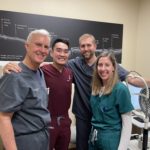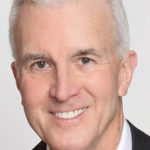
Left to right: Dr. Arnold with Klaus Ito (2021 extern- MCPHS), Dr. Michael Everson (Associate-Memorial Eye Center); Kristen Fuller (2021 extern MCPHS).
By Thomas P. Arnold, OD, FSLS
June 9, 2021
Work life as a new optometrist is exciting and filled with the potential for tremendous growth. Here are the big lessons I am passing on to new ODs, realizing the sooner they learn these lessons, the greater the career they likely will have. It is important for the rest of us to remember these lessons, too.
The practice and technology of optometry has changed much since my graduation from the University of Houston College of Optometry in 1984. Our professional tools did not yet include topography, Scheimpflug cameras, auto-refraction, optical coherence tomography, meibomography and other modern equipment. We have so many instruments that we now find indispensable and even take for granted.
Almost five years ago we began an externship program in our office for fourth-year optometry students. It is inspiring to see the young doctors’ enthusiasm and excitement as they start their professional journey. More than a generation removed from the start of my career, the differences are apparent. I have noticed a few key points many new optometrists can benefit from learning.
“Be a Good Observer”
This quote from a prominent retinal specialist who was my first boss after graduation has always stuck with me. With all the new technology surrounding our practices, there can be a tendency to rely too much on the instruments at the expense of our own observation. New graduates need to develop keen eyes and ears for accurate case assessments. Being an active and attentive listener is one of the most challenging skills to acquire. I recall being told in school to “listen to the patient and they will tell you what is wrong.”
We work with the externs to help them gather a good history, asking open-ended questions of the patient. The goal is to drill down to exactly why the patient is here. What are their concerns and expectations? The most thorough and technologically advanced exam is completely wasted if the patient does not feel that the practitioner has addressed their issues and questions.
Basic Clinical Skills Are Still Important
Retinoscopy may not be considered “old school” by seasoned practitioners who recognize its value. My impression, however, is that many new grads do not fully appreciate the power of retinoscopy. The reliance on auto-refraction may be one reason. On a difficult refraction or contact lens fit, picking up the retinoscope and observing the light reflex may yield much information otherwise missed. Getting to the heart of the matter quickly can be one advantage of retinoscopy. This is a skill that needs constant practice to become adept and efficient.
In this same vein, the ability to use a Maddox rod with prism bars is extremely useful. Horizontal phorias are usually easily revealed with a cover test. Vertical phorias are typically smaller in amplitude and may be overlooked. This type of muscle imbalance may lead to general asthenopic symptoms that are not resolved by simple refraction. Usually the addition of vertical prism in the final prescription is required.
Testing with a Maddox rod and prism bar is fast and simple for a patient to understand and cooperate with. While some externs are familiar with this test, we find that many are not. This is something we try to address with every rotation.
Other Articles to Explore
We Are a People Profession
We must make ourselves available at times convenient to our patients. Practice setting has a lot to do with this (professional building versus mall or discount chain). For many doctors, this means being open on Saturdays even with shortened hours or by appointment-only. It also means being in the office during student spring break and July-August if you see many families with school-aged children.
In an urban setting consider early morning hours (e.g. 7 a.m. or 8 a.m.) one or two days for business people headed to work. Similarly, having extended evening hours may be appreciated by some patients. These busy people might be more inclined to take care of all their eyecare needs at one time by purchasing eyewear (two pair, anyone?), as well as that one-year supply of contact lenses.
There is little doubt that the U.S. has experienced a cultural change in what defines not only success, but a healthy work-life balance. The old aphorism, “On their deathbed, no one wishes they spent more time at work,” is certainly true. However, be careful not to take this too far. For practitioners in a private practice environment with an emphasis on eyewear and contact lenses, being readily accessible is still important.
If more personal time is desired, consider working for a larger, group practice such as an MD-OD group, health maintenance organization, military service or Veterans Administration hospital.
In their rotation with us, we try to help the young doctors assess their desires and goals. Hopefully, this will lead them to the right career choice so they may enjoy all the wonderful opportunities and benefits that optometry has to offer.
 Thomas P. Arnold, OD, FSLS, is a partner with Memorial Eye Center at Sugar Land. To contact him: tarnold@memorialeyecenter.com
Thomas P. Arnold, OD, FSLS, is a partner with Memorial Eye Center at Sugar Land. To contact him: tarnold@memorialeyecenter.com





















